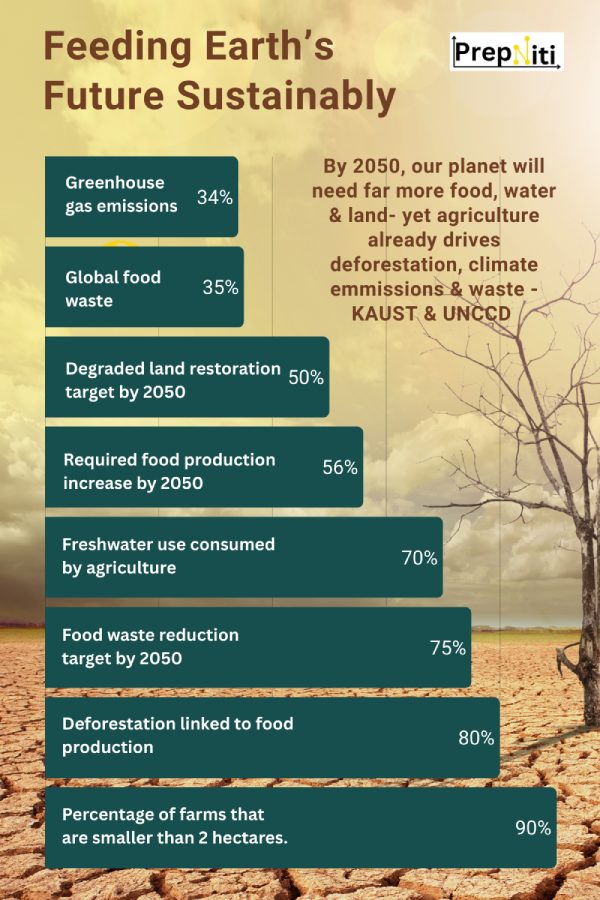A groundbreaking study reveals how integrated approaches to food systems could revolutionize global environmental policy…
As civil service aspirants prepare for examinations that increasingly emphasize environmental governance and sustainable development, a landmark study published in Nature offers crucial insights into one of the most pressing challenges of our time: land degradation. The research, led by 21 prominent scientists, presents a comprehensive roadmap that could fundamentally reshape how governments approach climate change, biodiversity conservation, and food security.
The Magnitude of the Challenge
The statistics are sobering. Currently, 34% of Earth’s ice-free land is dedicated to food production, a figure projected to reach 42% by 2050 if current trends continue. This expansion comes at an enormous environmental cost: food systems account for 21% of global greenhouse gas emissions, drive 80% of deforestation, and consume 70% of the world’s freshwater resources.

Dr. Fernando T. Maestre of King Abdullah University of Science and Technology, the study’s lead author, emphasizes the interconnected nature of these challenges: “This paper presents a bold, integrated set of actions to tackle land degradation, biodiversity loss, and climate change together, as well as a clear pathway for implementing them by 2050.”
Three Pillars of Transformation
1. Ambitious Land Restoration: The 50% Target
The study proposes an ambitious target of restoring 50% of degraded land by 2050—a significant leap from the current international commitment of 30% by 2030. This would involve rehabilitating 13 million square kilometers, comprising 3 million km² of cropland and 10 million km² of non-cropland.
However, the researchers emphasize that successful restoration cannot be imposed from above. It must involve Indigenous Peoples, smallholder farmers, women, and other vulnerable communities who depend on the land. The study recommends several policy interventions:
- Agricultural subsidy reform: Redirecting support from large-scale industrial farms to sustainable smallholders
- Land-based taxation: Implementing fiscal measures that reward sustainable farming and penalize environmental degradation
- Environmental labeling: Enabling consumers to make informed, planet-friendly choices
- Enhanced monitoring systems: Improving data collection and reporting mechanisms to track progress
2. The Food Waste Emergency: A 75% Reduction Goal
Perhaps the most striking finding relates to food waste. With approximately 33% of all food produced globally going to waste—14% lost post-harvest and 19% at retail and household levels—the study proposes a 75% reduction in food waste by 2050. This single measure could spare roughly 13.4 million square kilometers of land.
The research highlights Spain’s pioneering legislation as a model, which requires stores to donate or sell surplus food, restaurants to offer take-home containers, and all supply chain actors to implement formal waste reduction plans. Other recommended measures include:
- Policies preventing overproduction and spoilage
- Banning industry rules that reject “imperfect” produce
- Educational campaigns targeting household waste
- Supporting small farmers in developing countries with better storage and transport infrastructure
3. Marine Integration: Shifting from Land to Sea
The third pillar involves a fundamental dietary transition, particularly in wealthier nations with high meat consumption. The study recommends replacing 70% of unsustainably produced red meat with sustainably sourced seafood, which could spare 17.1 million square kilometers of land currently used for pasture and livestock feed.
Additionally, the research explores the potential of seaweed-derived products. Replacing just 10% of global vegetable intake with seaweed alternatives could free up over 400,000 square kilometers of cropland. Seaweed cultivation offers unique advantages: it requires no freshwater, absorbs atmospheric carbon, and can be produced sustainably in marine environments.

The Numbers That Matter
| Metric | Current Status | Proposed Target | Impact |
| Land restoration | 30% by 2030 (current target) | 50% by 2050 | 13 million km² restored |
| Food waste reduction | 33% currently wasted | 75% reduction target | 13.4 million km² saved |
| Red meat replacement | High consumption in wealthy nations | 70% shift to sustainable seafood | 17.1 million km² spared |
| Seaweed integration | Minimal current use | 10% vegetable replacement | 0.4 million km² freed |
| Total land impact | 43.8 million km² saved/restored |
Climate and Economic Co-Benefits
The environmental implications extend far beyond land conservation. The proposed measures would contribute to emission reduction efforts by mitigating approximately 13 gigatons of CO2-equivalent annually through 2050. This represents a significant contribution to global climate targets while simultaneously addressing biodiversity conservation and food security.
The economic dimensions are equally compelling. Currently, the world loses approximately US$1 trillion annually through food waste. Meanwhile, there exists a US$278 billion annual funding gap to achieve existing land restoration goals under the UN Convention to Combat Desertification (UNCCD).
Governance Implications for Future Civil Servants
For UPSC aspirants and future administrators, this study offers several critical insights into contemporary governance challenges:
Integrated Policy Approaches
The research demonstrates that environmental challenges cannot be addressed in isolation. Successful governance requires coordinating policies across agriculture, environment, trade, and international relations.
Multi-Level Implementation
The study emphasizes that 90% of the world’s 608 million farms are under 2 hectares, yet small farms produce 35% of global food. This highlights the importance of policies that work across different scales, from international agreements to local community initiatives.
Science-Policy Interface
The authors call for enhanced coordination among the three Rio Conventions (UNCCD, CBD, and UNFCCC), emphasizing the need for evidence-based policy making and better integration of scientific knowledge into governance frameworks.
International Cooperation: The Rio+ Approach
The study’s authors advocate for a coordinated approach among the UN’s three Rio conventions, focusing on shared land and food system goals. This represents a shift from sectoral approaches to integrated environmental governance—a trend that future civil servants must understand and navigate.
As co-author Barron J. Orr, UNCCD’s Chief Scientist, notes: “Land degradation isn’t just a rural issue, it affects the food on all our plates, the air we breathe, and the stability of the world we live in. This isn’t about saving the environment, it’s about securing our shared future.”
Looking Ahead: Policy Challenges and Opportunities
The study’s findings arrive at a critical juncture in global environmental policy. With climate negotiations intensifying and biodiversity targets under review, the integrated approach presented offers a pathway that addresses multiple challenges simultaneously.
For aspiring civil servants, the research underscores several key competencies that will be increasingly valuable:
- Systems thinking: Understanding interconnections between food, land, climate, and social systems
- Multi-stakeholder engagement: Working with diverse groups from Indigenous communities to international organizations
- Evidence-based policy development: Translating scientific research into practical governance solutions
- International cooperation: Navigating complex multilateral agreements and frameworks
The transformation outlined in this study—spanning an area larger than Africa—represents one of the most ambitious environmental undertakings in human history. Its success will depend largely on the vision, skills, and commitment of future leaders who understand that environmental challenges are fundamentally governance challenges.
As the authors conclude, this isn’t merely about environmental protection—it’s about securing a stable, prosperous future for all. For those preparing to serve in governance roles, few challenges will be more defining or more critical to get right.




